Related Research Articles
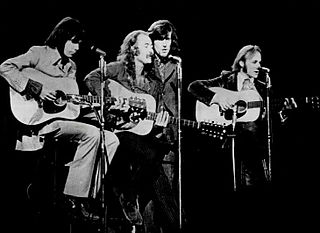
Crosby, Stills & Nash (CSN) was a folk-rock supergroup comprising American singer-songwriters David Crosby and Stephen Stills and English singer-songwriter Graham Nash. When joined by Canadian singer-songwriter Neil Young, they were known as Crosby, Stills, Nash & Young (CSNY). They are noted for their intricate vocal harmonies and lasting influence on American music and culture, their political activism and their tumultuous relationships.
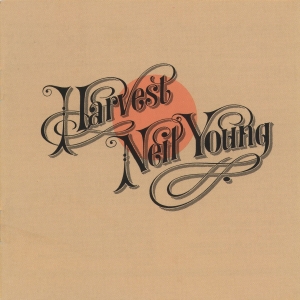
Harvest is the fourth studio album by Canadian-American musician Neil Young, released on February 1, 1972, by Reprise Records, catalogue number MS 2032. It featured the London Symphony Orchestra on two tracks and vocals by guests David Crosby, Graham Nash, Linda Ronstadt, Stephen Stills, and James Taylor. It topped the Billboard 200 album chart for two weeks, and spawned two hit singles, "Old Man", which peaked at No. 31 on the US Billboard Hot 100, and "Heart of Gold", which reached No. 1. It was the best-selling album of 1972 in the United States.

Stephen Arthur Stills is an American musician, singer, and songwriter best known for his work with Buffalo Springfield, Crosby, Stills & Nash, and Manassas. As both a solo act and member of three successful bands, Stills has combined record sales of over 35 million albums. He was ranked number 28 in Rolling Stone's 2003 list of "The 100 Greatest Guitarists of All Time" and number 47 in the 2011 list. Stills became the first person to be inducted twice on the same night into the Rock and Roll Hall of Fame. According to Neil Young, "Stephen is a genius".
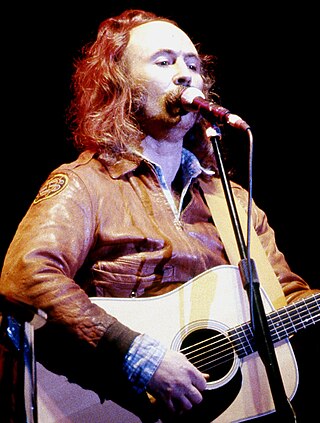
David Van Cortlandt Crosby was an American singer, songwriter, and guitarist. He first found fame as a member of the Byrds, with whom he helped pioneer the genres of folk rock and psychedelia in the mid-1960s, and later as part of the supergroup Crosby, Stills & Nash, who helped popularize the California sound of the 1970s. In addition to his music, Crosby was known for his outspoken personality, politics, and personal troubles; he was sometimes depicted as emblematic of the counterculture of the 1960s.

After the Gold Rush is the third studio album by the Canadian-American musician Neil Young, released in September 1970 on Reprise Records. It is one of four high-profile solo albums released by the members of folk rock group Crosby, Stills, Nash & Young in the wake of their chart-topping 1970 album Déjà Vu. Young's album consists mainly of country folk music along with several rock tracks, including "Southern Man". The material was inspired by the unproduced Dean Stockwell-Herb Bermann screenplay After the Gold Rush.

"Woodstock" is a song written by Canadian-American singer-songwriter Joni Mitchell. At least four notable versions of the song were released in the same year, 1970. Mitchell's own version was first performed live in 1969 and appeared in April 1970 on her album Ladies of the Canyon and as the B-side to her single "Big Yellow Taxi". This publication was preceded by Crosby, Stills, Nash & Young's version, which appeared on their March 1970 album Déjà Vu and became a staple of classic rock radio and the best-known version in the United States. A third version, by the British band Matthews Southern Comfort became the best known version in the United Kingdom, and was the highest charting version of the song, reaching the top of the UK Singles Chart in 1970. A fourth version by studio project the Assembled Multitude also became a chart hit.

Déjà Vu, is the second studio album by American folk rock group Crosby, Stills & Nash, and their first as a quartet with Neil Young. Released in March 1970 by Atlantic Records, it topped the pop album chart for one week and generated three Top 40 singles: "Woodstock", "Teach Your Children", and "Our House". It was re-released in 1977 and an expanded edition was released in 2021 to mark its fiftieth anniversary.

CSN is the third studio album by Crosby, Stills & Nash, released on Atlantic Records on June 17, 1977. It is the group's second studio release in the trio configuration. It peaked at No. 2 on the Billboard Top Pop Albums chart; two singles taken from the album, Nash's "Just a Song Before I Go" and Stills' "Fair Game" charted on the Billboard Hot 100. It is currently the trio configuration's best selling record, outselling 1969's Crosby, Stills & Nash by 200,000 copies. It has been certified quadruple platinum by RIAA.

"Marrakesh Express" is a song written by Graham Nash and performed by the band Crosby, Stills and Nash (CSN). It was first released in May 1969 on the self-titled album, Crosby, Stills and Nash, and released on a 45-RPM single in July of the same year, with another CSN song, "Helplessly Hoping", as its backing side. The single reached No. 28 on the Billboard Hot 100 on August 23, 1969. It reached the same position on the Easy Listening chart. The song was best received in the UK and Canada, reaching No. 17 in both nations. As a trio or quartet, this remains their only single to make the UK top 40 chart.

If I Could Only Remember My Name is the debut solo album by American singer-songwriter David Crosby, released on February 22, 1971, by Atlantic Records. It was one of four high-profile albums released by each member of Crosby, Stills, Nash & Young in the wake of their chart-topping 1970 album Déjà Vu. Guests on the album include Jerry Garcia, Graham Nash, Neil Young, Joni Mitchell, and other prominent West Coast musicians of the era.

Manassas is the 1972 debut double album by Manassas, a blues rock group led by American musician Stephen Stills, released April 1972. It was a critical comeback for Stills, and continued his commercial success by being certified Gold only a month after being released and peaking at number 4 on the US charts.

Stephen Stills is the debut solo album by American musician Stephen Stills released on Atlantic Records in 1970. It is one of four high-profile albums released by each member of Crosby, Stills, Nash & Young in the wake of their 1970 chart-topping album Déjà Vu, along with After the Gold Rush, If I Could Only Remember My Name and Songs for Beginners. It was primarily recorded between CSNY tours in London and Los Angeles. It was released in the United States on November 16, 1970, and in the United Kingdom on November 27, 1970.

Crosby & Nash were a musical duo that maintained a separate career in addition to the solo endeavors of David Crosby and Graham Nash, and separate from the larger aggregate of Crosby, Stills, Nash & Young. Crosby and Nash performed and recorded regularly during the 1970s, issuing five albums including three of original studio material. After the more or less permanent reformation of Crosby, Stills & Nash in 1976, the duo continued to play sporadic concerts from the 1980s through the second decade of the 21st century, issuing another studio album in 2004 and going on an extended concert tour in 2011.

American Dream is the fifth studio album by Crosby, Stills & Nash, and their second with Neil Young. Released in 1988 on Atlantic Records, it peaked at No. 16 on the Billboard 200 and has been certified platinum by the Recording Industry Association of America. To date, it is their final album of original material to receive either a gold or platinum citation by the RIAA. It is the highest-selling album by Neil Young in the 1980s. The album is dedicated to Jan Crosby, Anne Stills, Susan Nash and Pegi Young.
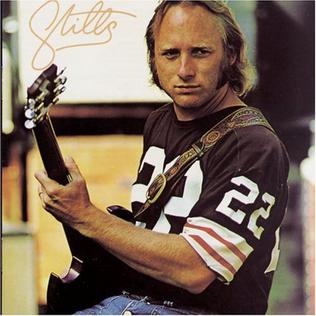
Stills is a 1975 studio album by American musician Stephen Stills. It is his third solo album and his first release on Columbia Records. The album was a commercial success on release, charting at number 19 on the US album charts, but was released to mixed critical reaction.

"Our House" is a song written by British singer-songwriter Graham Nash and recorded by Crosby, Stills, Nash & Young on their album Déjà Vu (1970). The single reached No. 30 on the U.S. Billboard Hot 100 and No. 20 on the Cash Box Top 100. The song, "an ode to countercultural domestic bliss", was written while Nash was living with Joni Mitchell, recording both Crosby, Stills & Nash and Déjà Vu.

"Only Love Can Break Your Heart" is a song written by Canadian-American singer-songwriter, musician, and activist Neil Young. It has been covered by many other artists.

4 Way Street is a live album by Crosby, Stills & Nash, and their second album as Crosby, Stills, Nash & Young. It was originally released as Atlantic Records SD-2-902, shipping as a gold record and peaking at No. 1 on the Billboard 200. A document of their tour from the previous year, the live recordings presented were taken from shows at the Fillmore East on June 2 through June 7, 1970; The Forum on June 26 through June 28, 1970; and the Auditorium Theatre on July 5, 1970.

The core discography of supergroup Crosby, Stills, Nash & Young consists of eight studio albums, five live albums, six compilation albums, four video albums, and 19 singles. Originally formed in 1968, the group released one album as the trio Crosby, Stills & Nash before recruiting Neil Young into the band for their first concerts in 1969. Of the band's eight studio albums, three have also included Young; and of the group's numerous tours, the quartet configuration has made concert tours in 1969, 1970, 1974, 2000, 2002, and 2006.
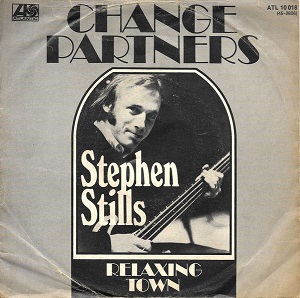
"Change Partners" is a song written by Stephen Stills that was released on his 1971 album Stephen Stills 2. It was also released as the debut single from the album, just missing the Top 40, and peaking at number 43 on the Billboard Charts, during the week of July 24, 1971 and spending 9 weeks on the chart.
References
- 1 2 "Week of February 25, 1989". Billboard. Retrieved 22 May 2023.
- ↑ Zimmerman, Lee (19 January 2023). "The 13 Best Songs by Crosby, Stills & Nash". Paste. Retrieved 22 May 2023.